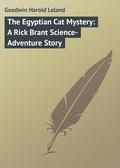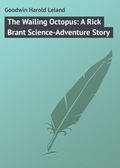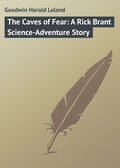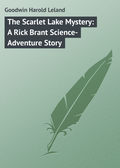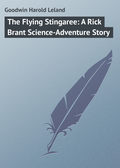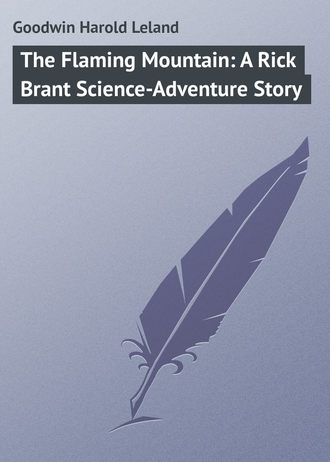
Goodwin Harold Leland
The Flaming Mountain: A Rick Brant Science-Adventure Story
CHAPTER III
Firing Parties
It was a shaken group of scientists that moved off in their jeeps to the preselected stations. Most of the adults had experienced earthquakes before, but none had seen the earth split almost at their feet. To Rick, the sensation had been as upsetting as any he had ever experienced.
"The one thing we learn to depend on," Zircon said, "is that the earth under our feet is solid and dependable. When it shakes like a jelly, it causes a kind of emotional shock, apart from any physical damage it may do."
"It certainly did with me," Rick agreed.
"Ditto," Scotty added.
Zircon put the jeep in gear and moved away from the hotel. He drove slowly over the narrow part of the crack in the parking lot, then picked up speed. Rick looked around. Bradley Connel and Ruiz were following in their own vehicle.
Zircon took a blacktop road to the west, close to the base of the mountain. Fortunately for Rick's peace of mind, the road was fairly smooth. He had never carried dynamite caps before, but he knew they contained fulminate of mercury, which is one of the most unstable and violent chemical substances, pound for pound, ever created.
The big scientist sensed his uneasiness. "Relax, Rick. Those caps won't go off without a substantial knock against something. Enjoy the scenery."
Rick grinned. "I'll try."
The scenery was tropical. Once away from the hotel grounds, there was heavy growth, vines, creepers, and broad-leafed plants. He saw palmetto and wild banana interspersed with Judas palms and other typical vegetation. The growth clung to the side of El Viejo like a thick green carpet. Now and then the jeep passed an open space in the vegetation and he saw the plains stretching away to the sea on his left.
The jeep climbed gradually and Rick realized that their direction had changed. They were now heading on the more northerly course. The vegetation was thinner, too, and he guessed it was because they were higher up the mountainside. At a rough estimate, the jeep had climbed nearly a thousand feet.
"Pumice quarry ahead," Zircon announced.
Rick saw ramshackle wooden buildings, then piles of grayish rock. A hundred yards farther on he saw an open pit. This was where the San Luzians mined pumice for export.
"Is there much of a market for it?" Scotty asked.
"Not as much as there was years ago," Zircon replied. "Pumice, as you probably know, is volcanic rock. But not an ordinary one. It's a kind of foamy lava honeycombed with gas bubbles. It's used as an abrasive. Modern industrial products have replaced it in general use, but apparently there's still enough demand so that the San Luzians are able to export a little. Our firing station is about a mile from here."
Rick looked at the rough terrain. "Think we can get through?"
"Easily. According to the map, we have an unpaved road part of the way."
The unpaved road turned out to be a pair of wagon tracks. But at least there were no trees in the way. Rick held on tight as Zircon shifted into four-wheel drive and forged ahead.
The big scientist kept an eye on his odometer, or mileage counter, while the boys watched for a clearing. It was slightly over a mile before they found one, and Zircon pulled off the road to let Brad Connel and Ruiz go by.
The jeep stopped as the two came abreast and the geologist called, "Want to trade stations?"
"We like this one," Zircon replied with a grin.
"Don't blame you. I have another three miles through this stuff. Well, so long."
The jeep started off and was soon lost as the path curved slightly.
Zircon looked at his watch. "Plenty of time, but we might as well get ready."
A few minutes search disclosed a spot far enough away from the clearing for safety, with no trees to be uprooted by the blast. Zircon took two of the dynamite sticks Rick carried and one of the caps. He placed the cap over one stick and used a special tool, like a jar opener, to crimp it into place.
"This is the only really delicate part of the operation," he said. "If the crimpers slip, they could set off the cap and the dynamite. So be careful when you do it. Keep the crimpers low on the flange of the cap."
He found a rubber band in his pocket and used it to hold the two sticks together. A coil of wire was produced next, and the connection made to the dynamite cap. Zircon dug a shallow hole with his heel and put the dynamite sticks in, then backed off unwinding wire as he went.
The detonator had been left in the jeep. Rick got it and carried it to where Zircon waited with the pair of wires.
"How does this thing work?" Scotty asked.
"It's a dynamo," Zircon replied. "When the handle is pushed down it engages gears that spin a flywheel, which operates the dynamo long enough to send an electrical charge through the wires."
"So don't sit on the handle," Rick joked.
"And don't kick it," Scotty added.
Zircon connected the wires to a pair of terminals on top of the detonator, then looked at his watch. "Plenty of time. We might as well take it easy. Anyone hungry?"
No one was. It was too soon after breakfast. Instead, Rick took the opportunity to ask questions.
"I can understand the general principle of what we're doing, but can you tell us exactly what happens?"
"Sure. When the dynamite charge goes off, it sends shock waves through the earth in all directions. Whenever a shock wave strikes something of different density, its direction and velocity change. For instance, if there is denser rock a few hundred feet down, that will cause a change of both velocity and direction. With me so far?"
"I think so," Scotty said. "The denser the stuff the wave strikes, the faster it moves. Like sound waves. I mean, sound moves faster in water than in air, and faster in a steel rail than in water. Is it the same?"
"Just about," Zircon agreed. "The shock waves radiate away from us, through the earth, and eventually reach the recorders on the other side of the mountain. You can see what happens, I think. Waves will arrive at different times, depending on the path they took and the kind of material they went through."
Rick nodded. "So if there's molten rock, or magma somewhere in the way, the shock wave that goes through it will slow down and arrive at the recorder later?"
"That's it. The tracings we get can be analyzed to give us a kind of cross-sectional look at the mountain. You see, we know how fast the waves travel through different kinds of earth structure. Also, we will know the point of the explosion and the location of the recorder for each shot. Which reminds me. We'd better get out the equipment and locate ourselves precisely."
"How?" Rick asked. "What will we use for landmarks?"
"The top of the mountain, for one, and if you'll look carefully to a point slightly south of east between those two banana palms, you'll see the top of the control tower at the airport."
Rick shook his head. "Good thing you're with us. I completely forgot to watch for landmarks."
"That was the first thing I had in mind in looking for a spot," Zircon told him.
The transit gave a precise angle between the two landmarks. Zircon drew a line on the map connecting the southern tip of the mountain and the airport tower. Then, with that as his base line, it was easy to draw two lines at the correct angles from each of the points. The transit's position was where the two lines intersected.
By the time the scientist had finished, it was nearly one o'clock. The three walked to the detonator. "Pull the handle up," Zircon directed. Rick did so. "I'll count down from ten seconds. Push down on zero."
It was like the countdown for a rocket firing, Rick thought. Zircon called out the time starting at one minute, then called off the last ten seconds. As he reached zero, Rick pushed the handle home.
The dynamite went off with a roar that sent leaves and dirt flying, and Rick felt the shock wave slam against his ears with stunning force.
"Open your mouth next time," Zircon said. "I forgot to warn you." He was already reeling in the wire. "Let's get going. One mile farther on for the next shot."
At the next station the same procedure was repeated, but before it was time, there was a far-off explosion. Zircon looked at his watch. "Brad Connel. Right on time." In another fifteen minutes there was an even more distant sound as David Riddle's first shot went off. They ate their lunch and listened to the echo off the mountain.
Zircon and the boys were ready when their time came. Location this time had been made on sightings toward the mountain, and a flagpole at Cape San Souci on the western side of the island.
The road petered out and they were forced to go cross-country to reach the third shot station. Fortunately, Brad Connel had left a path of crushed vegetation, so it was only necessary to follow where he had led.
After the third shot, the three collected their equipment and drove back to the hotel.
They were the first back. All three were sticky from the heat, and somewhat insect bitten. By unanimous consent they headed for the showers.
Rick dressed except for his shoes, then stretched out on his bed. He wondered what the day's work would show. The memory of the earthquake was still fresh, and he was anxious to see if it had come from rising magma far below, or from some other source. He had a mental image of white-hot rock rising sluggishly, melting a path to the surface. Now and then the magma struck water, or gas-producing minerals, and then there was a tightly held explosion that made the earth shudder.
Well, it was probably like that, from what he had read about volcanic action. Anyway, he could do without earthquakes. They were unnerving.
Scotty finished dressing, and Rick slipped on his shoes. It was time for the others to be back. Connel should have arrived only a few minutes behind them, but it would take longer for the others because they had gone around the mountain in the other direction.
The boys walked to the staff conference room and found Hartson Brant and Julius Weiss. The two were busy unrolling long strips of paper covered with blue shadings.
"Find anything yet?" Rick asked his father.
"No. We're just getting ready to take a look. How did it go?"
"No trouble. Zircon must still be in the shower. Probably Connel is, too. He must have been right behind us."
The scientists started poring over the traces.
"Here's your first shot," Hartson Brant said. He pointed to where a series of squiggles began. Rick could see nothing of interest. All the pen marks looked about the same to him. It would take expert analysis to make anything out of them.
The boys left the scientists to their work and wandered out into the parking lot. "I want to take a closer look at that crack," Rick said.
"Same here. Suppose it goes to China?"
Rick grinned at his pal. "That's a myth. If you drilled a hole straight down through the center of the earth from here you wouldn't come out anywhere near China. You'd be in the Southern Hemisphere."
"Don't get technical on me, boy."
The crack, however, went down only about three feet, gradually narrowing until it was closed. Even so, it was impressive. Rick knew that the actual break must continue down into the earth for some distance, perhaps for hundreds of feet. The force it took to shake the earth like that was awesome. Again he was reminded sharply of the kind of forces against which the Spindrift group was trying to contend, and he felt for the first time that the job was completely hopeless. What could mere men do?
A horn honking wildly brought him to quick attention. He turned and saw a jeep coming along the western road into the parking lot. Brad Connel! But where was Ruiz? Then, as the jeep neared, Rick saw. The San Luzian was lashed to an improvised stretcher lying across the back of the jeep!
The geologist drew to a stop, his face chalky.
"Get a doctor!" he shouted. "Quickly! Ruiz got caught in the last explosion. I think he's dead!"
CHAPTER IV
Seismic Tracings
Ruiz, the short, friendly San Luzian, was not dead, but he was only barely alive. Within a half hour he was on his way to the hospital at Calor, crushed and unconscious.
Brad Connel was badly shaken. "I thought he was behind me," the geologist explained. "But he had gone back to check the cap connection. At least, that's what he must have gone back for. I fired, then turned around, and he wasn't there. He was blown fifty feet at least. If only I had checked! But he was there with me, and I just kept my eye on the chronometer. He didn't say anything. He just walked off."
There was nothing much to be said. It was the kind of accident that seems absolutely senseless. Both Connel and Ruiz were old hands with explosives, yet the San Luzian apparently had wandered back to the charge just as it went off.
Rick and Scotty walked toward the hot springs behind the hotel and talked it over.
"Pretty stupid thing for anyone to do," Scotty said soberly.
Rick agreed. "Especially an old hand. Ruiz was supposed to be experienced, but I can't imagine how a veteran could pull a stunt like that."
It made absolutely no sense. Ruiz spoke English. Rick knew that from his conversation with the San Luzian. So he must have known Connel was counting down, getting ready to push the plunger home. Why would he walk into the blast, unless he was tired of living? But he didn't believe Ruiz would try to get himself killed deliberately. The little San Luzian had seemed like a sane, happy individual.
Rick gave up. Maybe when Connel calmed down a little he could shed more light on the accident. "The smell from the springs is getting pretty strong," Scotty remarked.
It certainly was. The wind had been from the hotel toward the hot springs most of the day, and the odor hadn't been bad. Now, in the vicinity of the springs, it was making Rick's eyes water and his nose smart.
"Think we can get close enough for a look?" Rick asked.
"We can try. There's the building ahead."
A cement walk led from the hotel to the springs, rising up a gradual incline that was not too steep for wheel chairs, or for the elderly. The boys had heard that many invalids had come here, to bathe in the hot springs, to drink the mineral water, and to soak in warm mud.
"How'd you like a nice hot mud bath?" Rick asked.
Scotty grinned. "Can't say it appeals to me, but there must be something to it. There are mud baths and hot springs in Europe, too. With plenty of customers."
Rick took out his handkerchief and dried eyes that were watering from the fumes. He doubted that the gases were good for them, but he was curious. He wanted to see where the volcano would blow its top, if it was going to.
In spite of the irritating fumes, they persisted and got a quick look at the former health area. There was a series of pools for bathers, ranging from big ones for large groups to individual tublike affairs, all nicely tiled. There was one area of mud baths. Rick had an impression of two areas, one of bubbling mud, the other of steaming water. It was enough. The boys turned and got out of there.
Back at the hotel, the scientists were working. All were present, except for Brad Connel, who had asked to be excused. He was in his room, apparently still badly upset over the accident.
Dr. Jeffrey Williams had obtained a large sheet of paper and had sketched an outline of the volcano and the earth under it as seen in cross section. As Hartson Brant read off data from the day's tracings, Dr. Williams plotted points far underground. Now and then he connected points, or put in a light line.
Rick and Scotty watched with interest. The tracings meant nothing to them; analysis was a job for trained scientists. But Dr. Williams was slowly producing a picture on the paper.
"That's all," Hartson Brant said finally. "How does it look, Jeff?"
The seismologist shook his head. "Not good." He held his pencil almost flat to the paper and began shading in an area bounded by the points he had made. "According to what we have, this is the shape of a magma front." He drew in other lines, rising vertically through the earth into the volcano. "Apparently these discontinuities indicate old channels, now filled in. Notice that the magma is not following the original channels. This seems to confirm what Esteben has been telling us."
The volcanologist nodded. "It seems to. Jeff, do you have any doubt about this area being magma?"
"I'm afraid not. The data fits. Of course it's still pretty far below the surface."
Rick could see that the ominous shading was nearly twice as far underground as the top of the volcano was above sea level.
Julius Weiss spoke up. "The next step is to find out how fast the magma is rising."
"A series of shots every day for the next few days should tell us that," Hartson Brant agreed. "Hobart, you've been pretty quiet. Any comments?"
"None of any importance," the big physicist boomed. "Only this: what can we possibly do about a situation like this?"
Hartson Brant shrugged. "I don't know. At least we can keep track of the magma."
David Riddle, the geologist, added, "It will allow time to warn the population. I can see no other means of saving them except to get them off the island."
Rick had reached the same conclusion. It didn't take a scientist to realize the gravity of the situation. El Viejo was getting ready for something big, unless the magma subsided. Since no one was really sure about the physics of volcanology, no one had a good guess why the volcanic action had begun again. No one could be sure it would not decrease, either.
"This picture is pretty rough," Dr. Williams said. "I'll refine it a little after dinner, Hartson. It will give us a better basis for plotting tomorrow's results."
"Good idea," Hartson Brant agreed. "And speaking of dinner, it's about time. Let's wash up and meet in the dining room in a half hour."
"Better call Brad Connel," Zircon said. "I know how upset he must be, but it will be better if he joins us and eats something."
Rick and Scotty returned to their room and washed for dinner. Both were quiet. The appearance of the magma under them, almost like a mushroom cloud in shape, was pretty ominous. Like sitting on a volcano, Rick thought. It was the most appropriate expression he could think of. No wonder the earth had split.
Scotty mused aloud. "Rock. Melting like butter on a stove. Thousands of tons of it. Makes you appreciate natural forces, doesn't it?"
"Even hydrogen bombs are pretty feeble by comparison," Rick agreed. "It makes me uneasy to think of all that stuff boiling up under us."
"I caught myself looking down a couple of times," Scotty said with a grin. "I wouldn't be surprised to see steam coming up through the rug."
Rick consulted his watch. "Maybe food will make us feel better. Come on. It's about time."
The scientific party was alone in the hotel, except for a reduced staff. The governor had made arrangements for the hotel to operate so that the visitors could have service. Rick almost wished they had stayed at a beach hotel with other people around them. The huge resort was like an abandoned city, with a few ghosts left in it.
They walked through the conference room on their way into dinner and found Connel looking over the sketch Williams had made. He looked up as they entered and greeted them casually.
"Hello, Rick, Scotty. I see we do have magma below us."
"That's what Dr. Williams said," Rick agreed. "How do you feel, Mr. Connel?"
The geologist shrugged. "How can I feel? Ruiz was – is – a nice little guy. I still don't know what happened, why he should walk back to the charge. I was concentrating on getting the charge off on time, and there was no reason for him to go back."
"You said he went to check the cap connection," Scotty reminded.
"It's the only reason I can think of, and it isn't a very good one. He made the connection himself. Maybe he wanted another quick look."
The geologist transferred his attention back to the sketch. "The stuff is still pretty far down. Good thing, too. That will give time for evacuating the island. We've probably got several months yet."
The subject wasn't brought up during dinner, but over coffee Esteben Balgos commented, "We must keep the governor informed. Jeff, if you will lend me your sketch, I'll take it to the Executive Mansion first thing in the morning and bring it back before we begin shooting. I think the governor will want to start planning for evacuation, if he has not yet done so."
Williams nodded. "Help yourself, Esteben. I'll probably have the sketch in my room. Knock on the door in the morning if you want it."
The talk turned to heat-transfer mechanisms in the earth, and from there to the whole problem of solar-energy input and outflow. The subject was not one in which Rick had any background, and it wasn't long before he lost interest. Besides, he was still tired from the trip, and the day's events had added their own burden of fatigue.
Scotty yawned, and Rick took the opportunity to suggest, "Let's go to bed."
"I'm with you."
The boys excused themselves and in a short time were settled down for the night. Rick fell asleep almost instantly.
He awoke with Scotty shouting in his ear. "Let's go, Rick! Trouble!"
Rick was on his feet, into trousers and shoes before he was fully awake. Scotty had already dashed into the corridor. Rick joined him and the rest of the scientists, who were standing in a group in front of Jeffrey Williams' room. The white-haired scientist was holding a handkerchief to a bloody bruise on his head. Rick hurried up just in time to hear him tell the group:
"I don't know what happened. My door wasn't locked, so anyone could have come in. I didn't see a soul. I must have dozed off."
"What's going on?" Rick demanded.
His father answered. "Someone came into Jeff's room and slugged him, apparently while he was dozing over the tracings. Both the tracings and the sketch are gone!"



